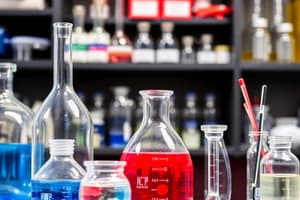Podcast
Questions and Answers
What is the primary purpose of liquid-liquid extraction in the laboratory?
What is the primary purpose of liquid-liquid extraction in the laboratory?
- To separate two immiscible liquids based on density (correct)
- To concentrate a solution by evaporation
- To combine two different solvents
- To measure the pH of different solutions
Which type of chromatography is best suited for separating large quantities of substances?
Which type of chromatography is best suited for separating large quantities of substances?
- Flash chromatography
- Paper chromatography
- Column chromatography (correct)
- Thin layer chromatography
During a titration, what is the significance of identifying the endpoint?
During a titration, what is the significance of identifying the endpoint?
- It establishes the density of the solution
- It signifies that the reaction is complete (correct)
- It shows the temperature at which the reaction occurs
- It indicates the amount of acid present in the solution
What is the primary principle behind distillation?
What is the primary principle behind distillation?
What type of phase separation does sublimation rely on?
What type of phase separation does sublimation rely on?
Which of the following statements about titration is false?
Which of the following statements about titration is false?
In the context of solvent extraction, which element is least likely to be separated using this method?
In the context of solvent extraction, which element is least likely to be separated using this method?
Which laboratory technique would you use to separate colored pigments from a mixture?
Which laboratory technique would you use to separate colored pigments from a mixture?
What is the primary purpose of extraction in laboratory processes?
What is the primary purpose of extraction in laboratory processes?
What happens to uncomplexed metal ions during the extraction process?
What happens to uncomplexed metal ions during the extraction process?
Which statement correctly describes the setup of extraction?
Which statement correctly describes the setup of extraction?
Which method employs liquid ion exchangers for extraction?
Which method employs liquid ion exchangers for extraction?
What is true about metals complexed by organics in the extraction process?
What is true about metals complexed by organics in the extraction process?
In what scenario is sublimation most effectively used?
In what scenario is sublimation most effectively used?
Which laboratory apparatus is typically used to illustrate an extraction process?
Which laboratory apparatus is typically used to illustrate an extraction process?
Which of the following processes is NOT typically involved in the separation of substances?
Which of the following processes is NOT typically involved in the separation of substances?
Flashcards are hidden until you start studying
Study Notes
Extraction
- Involves separating a substance from a mixture using a solvent.
- Mixture contact with solvent allows desired substance to dissolve while unwanted materials remain insoluble.
- Two immiscible phases (e.g., oil and water) are used for separation.
- Can include multistage separation for complex mixtures.
- Often used to extract metals like U, Zr, Hf, Th, and Lanthanides.
Titration
- Technique for determining the concentration of an acid or base by reacting it with a titrant of known concentration.
- Monitors pH changes during the reaction to identify endpoint.
- Useful in various laboratory analyses, including determining purity and concentration of solutions.
Distillation
- Process for separating components of a mixture based on differences in boiling points.
- Involves heating the mixture to vaporize the component with the lower boiling point, then condensing the vapor back into liquid form.
- Commonly used for purifying liquids or separating liquid-liquid mixtures.
Sublimation
- Process in which a solid turns directly into gas without passing through a liquid phase.
- Used to purify certain materials or substances that can easily sublimate.
- Effective for separating volatile solids from non-volatile impurities.
Chromatography
- Method for separating components in a mixture based on affinity for a stationary phase and a mobile phase.
- Thin-layer chromatography (TLC) and column chromatography are the primary types.
- Useful for analyzing complex mixtures and identifying individual components based on their movement through the medium.
Studying That Suits You
Use AI to generate personalized quizzes and flashcards to suit your learning preferences.




